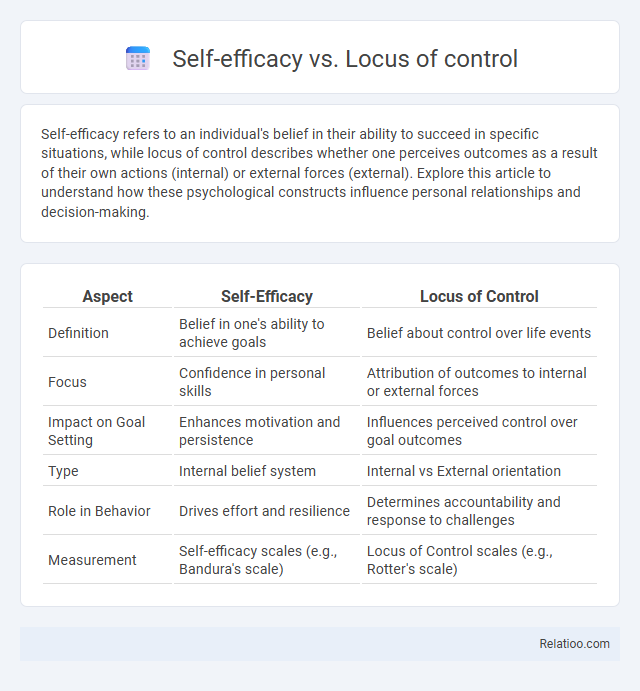Self-efficacy refers to an individual's belief in their ability to succeed in specific situations, while locus of control describes whether one perceives outcomes as a result of their own actions (internal) or external forces (external). Explore this article to understand how these psychological constructs influence personal relationships and decision-making.
Table of Comparison
| Aspect | Self-Efficacy | Locus of Control |
|---|---|---|
| Definition | Belief in one's ability to achieve goals | Belief about control over life events |
| Focus | Confidence in personal skills | Attribution of outcomes to internal or external forces |
| Impact on Goal Setting | Enhances motivation and persistence | Influences perceived control over goal outcomes |
| Type | Internal belief system | Internal vs External orientation |
| Role in Behavior | Drives effort and resilience | Determines accountability and response to challenges |
| Measurement | Self-efficacy scales (e.g., Bandura's scale) | Locus of Control scales (e.g., Rotter's scale) |
Understanding Self-Efficacy: Definition and Origins
Understanding self-efficacy involves recognizing your belief in your ability to succeed in specific situations, a concept developed by psychologist Albert Bandura. Unlike locus of control, which refers to your perception of control over life events, self-efficacy centers on confidence in executing actions to achieve desired outcomes. This distinction highlights how self-efficacy influences motivation and resilience, shaping your capacity to overcome challenges effectively.
Locus of Control: Meaning and Theoretical Background
Locus of Control refers to an individual's belief about the extent to which outcomes are controlled by internal factors, like personal efforts, or external forces, such as luck or fate. Rooted in Julian Rotter's social learning theory, this concept highlights how people with an internal locus believe they influence their own destiny, while those with an external locus attribute events to external circumstances. Your understanding of locus of control can significantly impact motivation, decision-making, and stress management in various aspects of life.
Self-Efficacy vs Locus of Control: Core Differences
Self-efficacy refers to Your belief in your ability to succeed in specific tasks, influencing motivation and persistence, whereas locus of control describes Your perception of control over life events, whether internal (self-driven) or external (outside forces). Core differences lie in self-efficacy's focus on confidence in performing actions, while locus of control centers on attributing outcomes to personal effort or external circumstances. Understanding these distinctions helps enhance personal development strategies by targeting either skill mastery or control attribution.
Psychological Foundations of Self-Efficacy
Self-efficacy, rooted in Bandura's social cognitive theory, represents Your belief in Your capabilities to execute actions required for desired outcomes, differing from locus of control which centers on whether individuals attribute outcomes to internal or external forces. The psychological foundation of self-efficacy involves cognitive processes such as mastery experiences, vicarious learning, verbal persuasion, and physiological states that shape Your confidence in performing specific tasks. Unlike locus of control that explains perception of control over events, self-efficacy directly impacts motivation, perseverance, and behavioral change through perceived personal competence.
Types of Locus of Control: Internal vs External
Self-efficacy refers to an individual's belief in their ability to execute tasks and achieve goals, while locus of control pertains to the degree to which people believe they have control over the outcomes in their lives. Types of locus of control include internal, where individuals attribute success or failure to their own actions, and external, where outcomes are seen as influenced by external forces like luck or fate. Understanding the distinction between self-efficacy and locus of control, especially the internal versus external dimensions, is crucial for developing strategies that enhance motivation and personal responsibility.
Impact on Motivation and Goal Achievement
Self-efficacy directly influences Your motivation by shaping confidence in your ability to achieve specific goals, thereby enhancing persistence and resilience during challenges. Locus of control affects motivation based on whether you attribute outcomes to internal efforts or external factors, with an internal locus fostering a stronger sense of personal responsibility and proactive behavior. While both concepts impact goal achievement, self-efficacy drives the belief in personal capability, and locus of control determines the perceived source of control over success, jointly shaping Your commitment and performance.
Role in Academic and Workplace Performance
Self-efficacy significantly influences your academic and workplace performance by shaping your confidence in completing tasks and overcoming challenges, promoting persistence and resilience. Locus of control impacts how you interpret outcomes; those with an internal locus typically take responsibility for their successes and failures, enhancing motivation and proactive behavior in both settings. Understanding the distinction between self-efficacy and locus of control helps tailor strategies for improving goal achievement and stress management in educational and professional environments.
Influence on Stress Management and Resilience
Self-efficacy, the belief in your ability to control outcomes, directly enhances stress management by empowering proactive coping strategies, while locus of control influences how you perceive control over external events, affecting your resilience by shaping responses to stressors. Internal locus of control correlates with higher resilience and effective stress management due to the perception of control over challenges, whereas external locus may lead to vulnerability under stress. Understanding the interplay between self-efficacy and locus of control enables tailored approaches to strengthen your resilience and improve stress coping mechanisms.
Enhancing Self-Efficacy and Shifting Locus of Control
Enhancing self-efficacy involves building your confidence in specific tasks through mastery experiences, social modeling, and positive feedback, which strengthens your belief in your abilities. Shifting locus of control from external to internal empowers you to perceive outcomes as a result of your own actions, promoting personal responsibility and motivation. Combining these approaches boosts resilience and goal achievement by fostering a proactive mindset and effective self-regulation strategies.
Practical Applications in Personal Development
Self-efficacy enhances personal development by boosting confidence in overcoming challenges and achieving goals, fostering persistence and skill-building. Locus of control influences motivation by shaping whether individuals attribute success to internal efforts or external factors, guiding accountability and decision-making. Integrating both concepts enables targeted strategies for improving resilience, goal-setting, and adaptive behaviors in personal growth contexts.

Infographic: Self-efficacy vs Locus of Control
 relatioo.com
relatioo.com